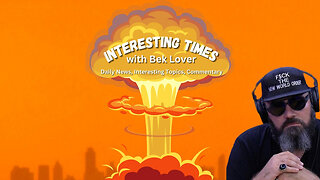Premium Only Content

The Myth of Perfection: A Radical Deconstruction of Modern Vanity and Self-Worth
We live in an era defined by facades—an age where curated personas are mistaken for identities, and the appearance of value often outweighs its substance. This isn’t just a social phenomenon but a system deeply embedded in our culture, economics, and even personal psychology. At its core is a seductive lie: perfection is attainable, and it is the ultimate measure of worth.
But what if this pursuit of perfection is the very thing keeping us from a deeper understanding of ourselves and our potential? What if it’s not just a trap but an intentional construct designed to distract, control, and commodify? This isn’t another rehash of “embrace authenticity”; it’s a call to unravel the very fabric of how we perceive identity, success, and beauty.
I. The Perfection Construct: A System, Not a Goal
1. Perfection as a Cultural Artifact
Perfection, as we understand it, is not a universal truth but a construct born from cultural, historical, and technological influences.
• The Historical Lens: Societies have always idolized certain ideals—whether it was the symmetry of ancient Greek statues or the pale, corseted figures of the Victorian era. Each generation’s “perfection” is as arbitrary as it is unattainable.
• Modern Amplification: With the advent of social media, these ideals are no longer limited to statues or paintings—they’re now algorithmically promoted, real-time images of supposedly ordinary people who embody perfection. This constant bombardment has made perfection feel both omnipresent and obligatory.
2. The Machinery of Perfection
Perfection is no longer just a personal aspiration—it’s an economic engine. Entire industries are built on sustaining dissatisfaction.
• The Beauty-Validation Economy: From cosmetic procedures to the billion-dollar filter industry, perfection is commodified at every turn.
• The Attention Economy: Social media platforms profit from your insecurity. The more you chase validation, the more time you spend on their platforms, feeding an ecosystem that thrives on your perceived inadequacy.
II. The Psychological Mirage: Why Perfection Feels Real
1. The Illusion of Progress
Perfection often feels attainable because it mimics a sense of progress. But this progress is illusory:
• The Moving Goalpost: Every step toward perfection reveals new flaws, ensuring you never arrive. You’re running a race with no finish line.
• Perpetual Dissatisfaction: This illusion keeps people in a constant state of striving, fueling industries and systems that profit from the chase.
2. The Brain’s Validation Loop
The psychological mechanisms at play are deeply ingrained:
• Neurological Shortcuts: Positive reinforcement through likes, comments, and compliments triggers dopamine, creating an addiction to external validation.
• Identity Crisis: Over time, this external validation begins to replace intrinsic self-worth, leading to a fragile sense of identity that’s dependent on others’ approval.
III. The Hidden Costs of the Perfection Illusion
1. On Individual Potential
Chasing perfection narrows focus, often at the expense of creativity, individuality, and growth.
• Creativity Suffers: True creativity requires risk, imperfection, and failure. A culture obsessed with perfection discourages experimentation.
• Identity Erosion: In striving to meet external standards, individuals often lose sight of their unique strengths, passions, and quirks.
2. On Social Dynamics
The perfection myth distorts relationships, fostering superficial connections and reinforcing hierarchies.
• Transactional Relationships: When self-worth is tied to appearance or status, relationships often become exchanges of validation rather than authentic connections.
• Exclusionary Systems: The myth of perfection creates in-groups and out-groups, perpetuating societal divides based on arbitrary standards.
3. On Society
On a macro level, the perfection obsession distracts from systemic issues and fosters conformity.
• Distraction from Real Issues: While people focus on self-improvement, systemic inequities remain unchallenged.
• Conformity Over Revolution: The perfection myth encourages adherence to societal norms, suppressing radical thought and collective action.
IV. A Paradigm Shift: Redefining Value
1. Beyond the Binary of Flaws and Perfection
The first step in breaking free is rejecting the binary thinking that defines flaws as negatives and perfection as positives.
• Flaws as Features: What society deems “flaws” are often markers of individuality and resilience. Embracing these can unlock creativity and self-discovery.
• Perfection as Limitation: Perfection, by definition, is a closed system. It leaves no room for growth or evolution.
2. The Power of Process
Reframe success as a journey rather than a destination.
• Iterative Growth: Focus on small, meaningful improvements over arbitrary ideals.
• Celebrate Complexity: Recognize that life’s richness lies in its contradictions and imperfections.
V. Practical Rebellion: Steps Toward Liberation
1. Disrupting the Feedback Loop
Take control of your relationship with validation:
• Digital Detox: Limit your exposure to social media and other validation-driven platforms.
• Internal Metrics: Develop personal benchmarks for success that are independent of external approval.
2. Building Authentic Communities
Surround yourself with people who value authenticity over appearance:
• Mutual Support Networks: Create spaces where vulnerability and honesty are celebrated.
• Shared Purpose: Engage in projects and activities that align with your values, rather than seeking validation.
3. Redefining Success
Reframe your goals in ways that prioritize meaning and fulfillment over perfection:
• Legacy Over Image: Focus on the impact you want to leave on the world, rather than how you appear in the moment.
• Skill Over Status: Invest in developing skills and knowledge that bring intrinsic satisfaction.
VI. The Radical Truth: Embracing Chaos
The ultimate rebellion against the perfection myth is embracing life’s inherent chaos:
• Life as Art: Instead of striving for a flawless masterpiece, see your life as a dynamic, ever-evolving work of art.
• Connection Through Imperfection: Recognize that the most meaningful connections often arise from shared vulnerabilities and struggles.
VII. Conclusion: A New Framework for Worth
The perfection myth is not just a personal struggle—it is a societal construct designed to distract, divide, and profit. Breaking free requires more than self-awareness; it demands a collective shift in how we define value, success, and identity.
This is not a call to reject improvement or beauty but to redefine them on your terms. It’s about reclaiming the narrative of your life from the systems that seek to control it. In doing so, you’ll discover that true worth isn’t found in perfection—it’s found in the messy, vibrant, and imperfect reality of being human.
-
 1:50
1:50
FragmentsOfTruth
18 hours agoThe Silent Threat: Are Everyday Products Lowering Testosterone Levels?
69 -
 20:07
20:07
Scammer Payback
14 hours ago$4,000,000 Trap set on a Scammer
31K5 -
 5:45
5:45
Tactical Advisor
1 day agoWoox New Lever Action | Shot Show 2025
24.5K2 -
 16:25
16:25
Clownfish TV
12 hours agoDEI is Deader Than Disco! Hollywood Most Affected?!
20.9K5 -
 1:04:23
1:04:23
CarlCrusher
14 hours agoThe TRUTH about Roswell and the UFO Crash Recovery Material
16.6K4 -
 59:40
59:40
Trumpet Daily
20 hours ago $4.52 earnedAmerica’s Royal Family - Trumpet Daily | Jan. 21, 2025
17.5K19 -
 1:03:14
1:03:14
Bek Lover Podcast
13 hours agoInteresting Times with Bek Lover Podcast
40.2K6 -
 3:10:10
3:10:10
Price of Reason
16 hours agoTrump is BACK in Action! Elon Musk's Inauguration Gesture Draws MSM Fire! Disney Prepares For LOSSES
50.9K8 -
 2:08:22
2:08:22
Kim Iversen
15 hours agoIs This Even Legal? Trump’s Push to End Birthright Citizenship and The Insane Plan to Move Palestinians to Indonesia
147K305 -
 1:27:06
1:27:06
Glenn Greenwald
15 hours agoMr. Tracey Goes To Washington: Inauguration Observations, Interviews & Commentary | SYSTEM UPDATE #393
176K62